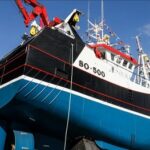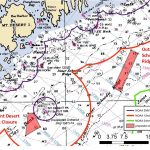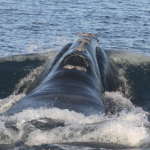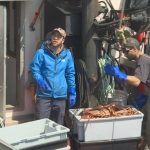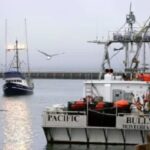Tag Archives: new report
New England labor unions call for faster offshore wind buildout
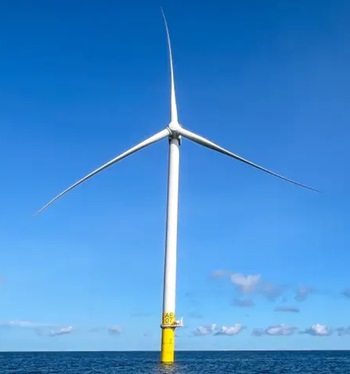 “We looked at the way this industry was starting to develop and thought to ourselves: How can we work as a labor movement to make sure we’re making this an industry that is not only going to benefit the climate but benefit our members?” (read the report) said Patrick Crowley, president of the Rhode Island chapter of the American Federation of Labor and Congress of Industrial Organizations (AFL-CIO), which represents roughly 900,000 union members across the three states. Crowley and the AFL-CIO partnered with the Climate Jobs National Resource Center and unions in Massachusetts and Connecticut to put together the new report, which outlines how the industry can expand with organized labor at the forefront. To begin with, the union report suggests that the states aim higher for their offshore wind goals in order to boost the region’s economy and take full advantage of their unique access to wind. more, >>CLICK TO READ<< 09:25
“We looked at the way this industry was starting to develop and thought to ourselves: How can we work as a labor movement to make sure we’re making this an industry that is not only going to benefit the climate but benefit our members?” (read the report) said Patrick Crowley, president of the Rhode Island chapter of the American Federation of Labor and Congress of Industrial Organizations (AFL-CIO), which represents roughly 900,000 union members across the three states. Crowley and the AFL-CIO partnered with the Climate Jobs National Resource Center and unions in Massachusetts and Connecticut to put together the new report, which outlines how the industry can expand with organized labor at the forefront. To begin with, the union report suggests that the states aim higher for their offshore wind goals in order to boost the region’s economy and take full advantage of their unique access to wind. more, >>CLICK TO READ<< 09:25
A new report acknowledged the ongoing damage done by dams on the Columbia River. But that’s only part of the story.
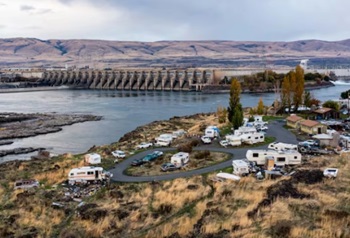 The Biden administration released a report this week acknowledging “the historic, ongoing, and cumulative damage and injustices that the federal dams on the Columbia River have caused and continue to cause to Tribal Nations.” In government documents from the 1940s and 1950s, obtained by OPB and ProPublica, officials openly discussed what they called “the Indian problem” on the Columbia River. At times, they characterized the destruction of the last major tribal fishery as a benefit of dam construction. The documents reveal that the government’s 1950s era of dam-building on the Columbia was marked not by a new report, but rather by a well-informed and intentional disregard for Native people. “These documents shine a spotlight on a historic wrong” U.S. Sen. Jeff Merkley, an Oregon Democrat, said in a statement. “The government’s actions wiped out tribal communities, houses, villages, and traditional hunting and fishing sites with thousands of years of history.” more, >>CLICK TO READ<< 21:10
The Biden administration released a report this week acknowledging “the historic, ongoing, and cumulative damage and injustices that the federal dams on the Columbia River have caused and continue to cause to Tribal Nations.” In government documents from the 1940s and 1950s, obtained by OPB and ProPublica, officials openly discussed what they called “the Indian problem” on the Columbia River. At times, they characterized the destruction of the last major tribal fishery as a benefit of dam construction. The documents reveal that the government’s 1950s era of dam-building on the Columbia was marked not by a new report, but rather by a well-informed and intentional disregard for Native people. “These documents shine a spotlight on a historic wrong” U.S. Sen. Jeff Merkley, an Oregon Democrat, said in a statement. “The government’s actions wiped out tribal communities, houses, villages, and traditional hunting and fishing sites with thousands of years of history.” more, >>CLICK TO READ<< 21:10
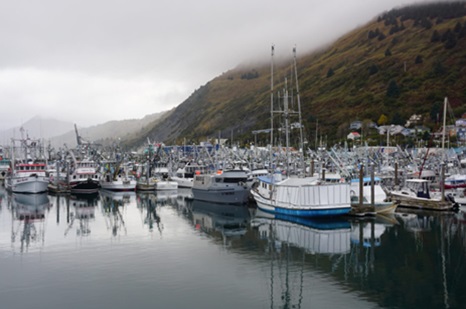
Report portrays mixed picture of Alaska’s huge seafood industry
The report from the McKinley Research Group, titled The Economic Value of Alaska’s Seafood Industry, is the latest in a periodic series commissioned by the Alaska Seafood Marketing Institute. The total economic value of the Alaska seafood industry in 2021 and 2022 was $6 billion, slightly more than the $5.6 billion tallied in 2019, the last full year prior to the COVID-19 pandemic, according to the new report and the previous version published in 2022. Along with that good news, the McKinley Research Group’s report contains a warning about the industry’s economic future. The seafood industry, between harvesters, processors and managers, accounted for 48,000 jobs on average in 2021 and 2022, equivalent to 29,100 full-time positions, the report said. That is a reduction from the 62,200 total jobs in 2019, the equivalent of 37,400 full-time positions. more, >>CLICK TO READ<< 11:21
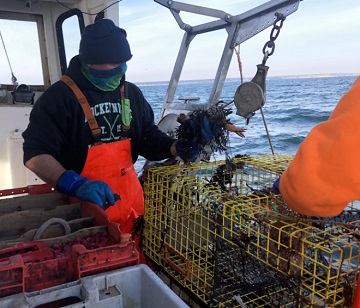
A discussion – Costs of using ropeless fishing gear could sink MA lobster fishery: new report
Experts often say the lobster fishery will have to move to innovative “ropeless” fishing gear to protect North Atlantic right whales from entanglement. There fewer than 340 of the critically endangered whales left. But a new report says Massachusetts lobstermen may be headed for troubled economic waters if they make the switch. But here’s what’s really crazy: the state found that even if lobstermen were just given the on-demand gear for free, using government and nonprofit subsidies, they would still go from making $15 million per year in revenue to just $2 million in revenue per year. And the biggest impacts would be on smaller, more independent operators. I talked to the report author about this, Noah Oppenhiem. He said for lobstermen that only fish only a couple traps per vertical line, they’d go from needing 6 and a half minutes to haul up some lobsters to 11 and a half minutes. >click to read< 11:56
Mass DMF’s On-Demand Fishing Gear Economic Modeling Report Released – >Click to read<
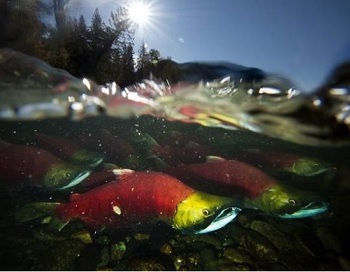
Alaskan fishing fleet catching huge proportion of B.C. salmon
As salmon runs in British Columbia hit record lows, commercial fisheries along the Alaska panhandle are catching a growing share of salmon bound for B.C. rivers, according to a new technical report. The report, which includes a detailed analysis on each B.C. salmon species caught in Southeast Alaskan interception fisheries, was commissioned by Watershed Watch Salmon Society and SkeenaWild Conservation Trust and comes as Canada and the United States begin their annual review of bilateral management under the Pacific Salmon Treaty. Many of B.C.’s largest salmon runs pass through Alaskan waters on their way home to spawn in Canadian rivers. >click to read< 11:50
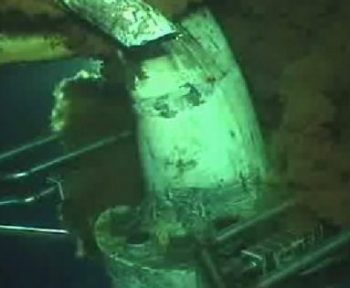
Near Deepwater Horizon Spill Site, Sea Creatures Looking For Mates Find Death Instead
It’s been almost a decade since an explosion on the Deepwater Horizon oil rig caused nearly five million barrels of oil to leak into the Gulf of Mexico. It was a catastrophe for Gulf ecosystems and, even now, wildlife still tend to avoid the site. But there are a couple of notable exceptions,,, some deep-sea shrimp and red crab looking for potential mates are turning up at the site, only to find sickness and death, due to oil spill contamination. >click to read< 20:08


































